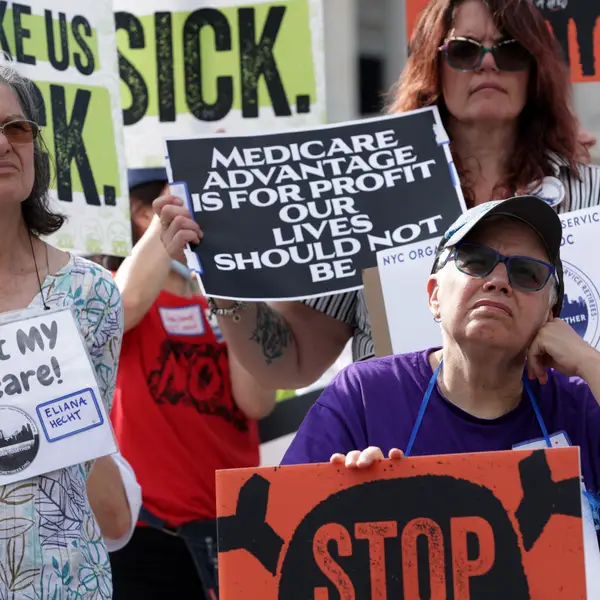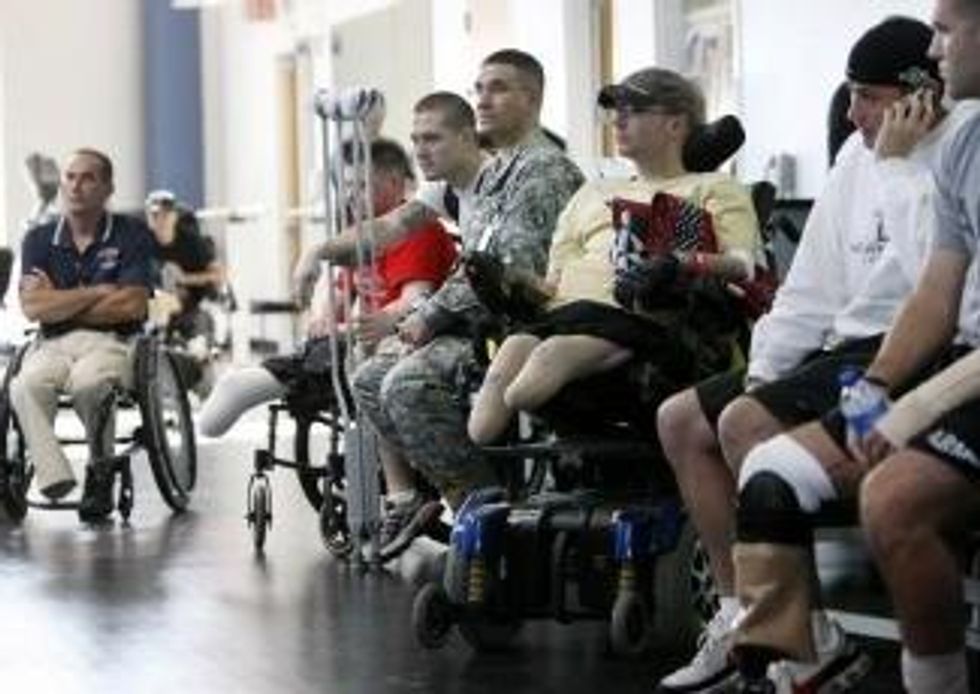The last two debates have made one aspect of Republican ideology abundantly clear: they think socialism is terrific and they are pledging to increase it. That's not always the case: socialized medicine, for example, is an un-American heresy for teachers, cops, janitors or firefighters. But for military veterans, Republicans think it is not only acceptable but our sacred duty to provide abundant government services. If veterans come up in Thursday night's debate in Jacksonville, you can be sure the candidates will contradict their supposed faith in the magic of the market.
When asked at last Thursday's debate in Charleston about the needs of veterans returning from Iraq and Afghanistan, even Ron Paul, otherwise a consistent believer in the free market and small government, abandoned his principles. "Where the veterans really deserve help, both as a physician and as a congressman, is the people who've come back and aren't doing well health-wise," said Paul. "They need a lot more help. We have an epidemic now of suicide of our military coming back. So they need a lot of medical help, and I think they come up shortchanged. They came up shortchanged after Vietnam War, Persian Gulf War and even now. They don't get care from the Veterans Administration."
Rick Santorum agreed with Paul about medical care but disagreed with Paul's assessment that cuts in taxes and spending would solve the veterans' unemployment problem. "We need to be much, much more aggressive," said Santorum, who noted that his parents worked for the VA and he grew up in a government-provided apartment on VA grounds. "We have a president of the United States who said he is going to cut veterans' benefits, cut our military, at a time when these folks are--four, five, six, seven tours, coming back, in and out of jobs, sacrificing everything for this country, and the president of the United States can't cut one penny out of the social welfare system and he wants to cut a trillion dollars out of our military and hit our veterans. And that's disgusting."
Of course, the fact that healthcare and employment programs are a form of social welfare appears not to occur to Santorum. While he views social welfare as bad except when the beneficiaries are a group he favors, this does not change his view of social welfare in general. Instead, he lies and says it's not social welfare. It's also untrue that Obama wouldn't "cut one penny" out of other social welfare programs. In fact, the same deficit reduction deal that cuts security spending cut domestic discretionary spending by an equal amount.
The security spending cuts Santorum refers to were passed by Republicans in Congress, not dictated by fiat by President Obama. And they are cuts to national security spending, which includes the Pentagon, CIA, Homeland Security and other agencies. There's no reason to expect major cuts to veterans services, but nonetheless Santorum and Mitt Romney have been accusing Obama of cutting spending on veterans.
Romney wanted to find a way to square the Republican affection for veterans' welfare programs with their distaste for the federal government. He arrived at a preposterous solution, presumably inspired by his tortured position on healthcare reform: that social spending is great, but only if it's implemented at the state level, as he did in Massachusetts. "In our state we found a way to help our--our veterans by saying, Look, if you're going to come back, particularly if you're in the National Guard, we'll pay for your education, college degree, both the fees and tuition--we'd give you a full ride," bragged Romney. "And we also had a plan that said, if you come back and you've been out of work for a year or more, we're going to put a--like a bonus on your back, which, if anyone hires you, that bonus goes to them to pay for your training. So we can encourage that to occur. But let's do it at the state level. Let's not have the federal government continue to extend its--its tentacles into everything that goes on in this country." As Romney frequently points out in defense of his moderate record as Governor of Massachusetts, that state has an 85 percent Democratic state legislature. The fact that Republican states such as, say, Mississippi might not provide these same services to their veterans appears not to bother Romney. But is the service of a soldier any less valuable if he has the misfortune to come from a right-wing state?
Newt Gingrich, who may have even less commitment to principles than Romney despite being Romney's supposed conservative alternative, outflanked his opponents from the left. He took issue with Paul's contention that the free market found jobs for 10 million veterans returning from World War II all on its own. "They created a GI Bill which enabled literally millions of returning veterans to go to college for the very first time," recalled Gingrich. "My father, when--who was in the Second World War, went to college on a GI Bill. So there was an enormous expansion of opportunity that enabled them to integrate into a new, emerging society."
Gingrich's apparent view: that federal college tuition subsidies are good for veterans, but only for veterans. The same goes for healthcare. The next question in the debate was how to repeal "Obamacare." The candidates pledged to do so without any apparent awareness that they had just accepted the premise that providing government healthcare is a good thing when they think the recipient is deserving. Left unexplained is why military veterans are the only people whose work they value. What about police officers and firefighters? Aren't these first responders on the front lines of our current war against terrorism? We lost more of them than soldiers in the attacks of September 11. What about schoolteachers or home health aides? Perhaps the most relevant group is entrepreneurs. Unlike payroll employees, someone starting a small business does not get health insurance through his or her job. Republicans love to lionize small-business owners. They defend them as job creators and argue (disingenuously) that we cannot raise income taxes on top earners because that would hit successful small business owners. But fear of losing one's health insurance is a major disincentive to strike out on your own and start a business. Why don't these pillars of society deserve medical care?
The implied moral superiority of veterans is a recurrent theme on the Republican campaign trail. Mitt Romney asks veterans and active-duty service personnel to raise their hands at his rallies and the audience applauds them. Newt Gingrich wraps himself in military figures and paraphernalia, holding a "veterans' town hall" in front of a tank at a World War II museum in New Hampshire, and being introduced by veterans among fighter planes at a speech on an aircraft carrier in South Carolina. Paul plays the veteran card, blasting Gingrich for dodging the draft and touting his own service. "I'm the only US veteran on this stage tonight," Paul declared at the debate last Thursday in Charleston.
In Monday's debate in Tampa, Gingrich and Romney both declared their support for one component of the DREAM Act: allowing immigrants who serve in the military to become citizens. But they oppose letting illegal immigrants brought here as children receive in-state college tuition.
Mark Krikorian of National Review criticized Gingrich for taking this position by noting how irrelevant it is. Only 3,000 people per year would qualify for Gingrich's exception. Moreover, the Secretary of Defense already has the authority under current law to enlist illegal immigrants, and, once enlisted, they can apply for citizenship. Poor innocent Krikorian, he thinks that Republican candidates articulate policy positions based on whether they actually think they are necessary. Obviously Gingrich didn't take this stance because he knows and cares about the details of immigration policy. It's all about politics: among Republicans every principle flies out the window where veterans are concerned. Socialized medicine and federal investments in education become good things, and illegal immigrants are transmogrified from criminals deserving speedy deportation to model citizens. This plays well among the types of voters who slap "Support Our Troops" stickers on their SUVs, but it has little to do with rational policy or principle.




